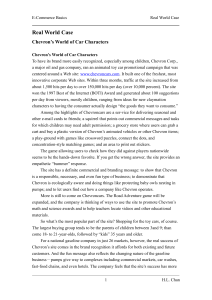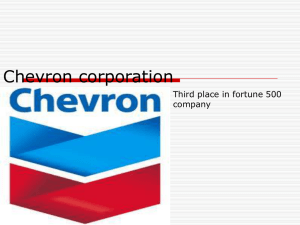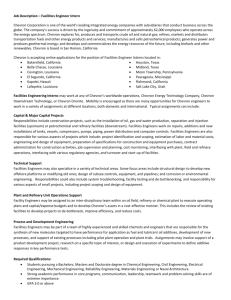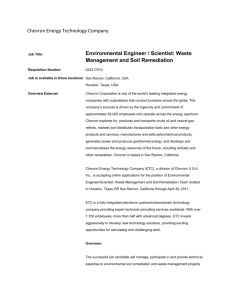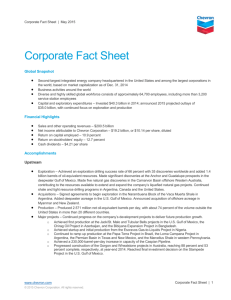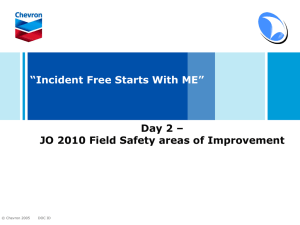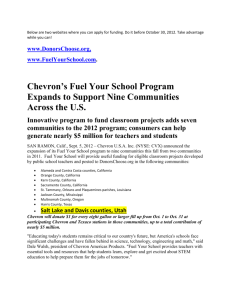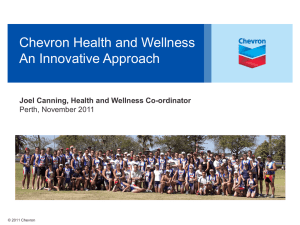PDF - Chevron Bangladesh
advertisement
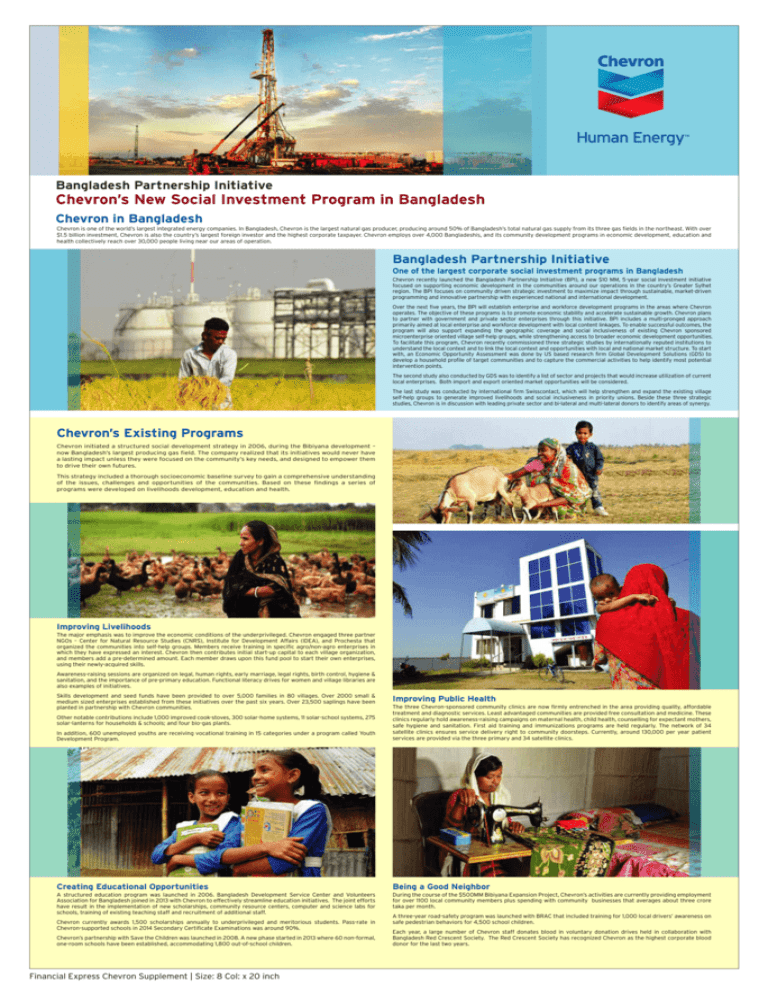
Bangladesh Partnership Initiative Chevron’s New Social Investment Program in Bangladesh Chevron in Bangladesh Chevron is one of the world’s largest integrated energy companies. In Bangladesh, Chevron is the largest natural gas producer, producing around 50% of Bangladesh’s total natural gas supply from its three gas fields in the northeast. With over $1.5 billion investment, Chevron is also the country’s largest foreign investor and the highest corporate taxpayer. Chevron employs over 4,000 Bangladeshis, and its community development programs in economic development, education and health collectively reach over 30,000 people living near our areas of operation. Bangladesh Partnership Initiative One of the largest corporate social investment programs in Bangladesh Chevron recently launched the Bangladesh Partnership Initiative (BPI), a new $10 MM, 5-year social investment initiative focused on supporting economic development in the communities around our operations in the country’s Greater Sylhet region. The BPI focuses on community driven strategic investment to maximize impact through sustainable, market-driven programming and innovative partnership with experienced national and international development. Over the next five years, the BPI will establish enterprise and workforce development programs in the areas where Chevron operates. The objective of these programs is to promote economic stability and accelerate sustainable growth. Chevron plans to partner with government and private sector enterprises through this initiative. BPI includes a multi-pronged approach primarily aimed at local enterprise and workforce development with local content linkages. To enable successful outcomes, the program will also support expanding the geographic coverage and social inclusiveness of existing Chevron sponsored microenterprise oriented village self-help groups, while strengthening access to broader economic development opportunities. To facilitate this program, Chevron recently commissioned three strategic studies by internationally reputed institutions to understand the local context and to link the local context and opportunities with local and national market structure. To start with, an Economic Opportunity Assessment was done by US based research firm Global Development Solutions (GDS) to develop a household profile of target communities and to capture the commercial activities to help identify most potential intervention points. The second study also conducted by GDS was to identify a list of sector and projects that would increase utilization of current local enterprises. Both import and export oriented market opportunities will be considered. The last study was conducted by international firm Swisscontact, which will help strengthen and expand the existing village self-help groups to generate improved livelihoods and social inclusiveness in priority unions. Beside these three strategic studies, Chevron is in discussion with leading private sector and bi-lateral and multi-lateral donors to identify areas of synergy. Chevron’s Existing Programs Chevron initiated a structured social development strategy in 2006, during the Bibiyana development – now Bangladesh’s largest producing gas field. The company realized that its initiatives would never have a lasting impact unless they were focused on the community’s key needs, and designed to empower them to drive their own futures. This strategy included a thorough socioeconomic baseline survey to gain a comprehensive understanding of the issues, challenges and opportunities of the communities. Based on these findings a series of programs were developed on livelihoods development, education and health. Improving Livelihoods The major emphasis was to improve the economic conditions of the underprivileged. Chevron engaged three partner NGOs – Center for Natural Resource Studies (CNRS), Institute for Development Affairs (IDEA), and Prochesta that organized the communities into self-help groups. Members receive training in specific agro/non-agro enterprises in which they have expressed an interest. Chevron then contributes initial start-up capital to each village organization, and members add a pre-determined amount. Each member draws upon this fund pool to start their own enterprises, using their newly-acquired skills. Awareness-raising sessions are organized on legal, human rights, early marriage, legal rights, birth control, hygiene & sanitation, and the importance of pre-primary education. Functional literacy drives for women and village libraries are also examples of initiatives. Skills development and seed funds have been provided to over 5,000 families in 80 villages. Over 2000 small & medium sized enterprises established from these initiatives over the past six years. Over 23,500 saplings have been planted in partnership with Chevron communities. Improving Public Health In addition, 600 unemployed youths are receiving vocational training in 15 categories under a program called Youth Development Program. The three Chevron-sponsored community clinics are now firmly entrenched in the area providing quality, affordable treatment and diagnostic services. Least advantaged communities are provided free consultation and medicine. These clinics regularly hold awareness-raising campaigns on maternal health, child health, counselling for expectant mothers, safe hygiene and sanitation. First aid training and immunizations programs are held regularly. The network of 34 satellite clinics ensures service delivery right to community doorsteps. Currently, around 130,000 per year patient services are provided via the three primary and 34 satellite clinics. Creating Educational Opportunities Being a Good Neighbor A structured education program was launched in 2006. Bangladesh Development Service Center and Volunteers Association for Bangladesh joined in 2013 with Chevron to effectively streamline education initiatives. The joint efforts have result in the implementation of new scholarships, community resource centers, computer and science labs for schools, training of existing teaching staff and recruitment of additional staff. During the course of the $500MM Bibiyana Expansion Project, Chevron’s activities are currently providing employment for over 1100 local community members plus spending with community businesses that averages about three crore taka per month. Other notable contributions include 1,000 improved cook-stoves, 300 solar-home systems, 11 solar-school systems, 275 solar-lanterns for households & schools; and four bio-gas plants. Chevron currently awards 1,500 scholarships annually to underprivileged and meritorious students. Pass-rate in Chevron-supported schools in 2014 Secondary Certificate Examinations was around 90%. Chevron’s partnership with Save the Children was launched in 2008. A new phase started in 2013 where 60 non-formal, one-room schools have been established, accommodating 1,800 out-of-school children. Financial Express Chevron Supplement | Size: 8 Col: x 20 inch A three-year road-safety program was launched with BRAC that included training for 1,000 local drivers’ awareness on safe pedestrian behaviors for 4,500 school children. Each year, a large number of Chevron staff donates blood in voluntary donation drives held in collaboration with Bangladesh Red Crescent Society. The Red Crescent Society has recognized Chevron as the highest corporate blood donor for the last two years.
